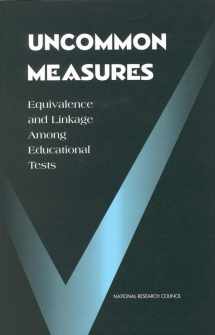
Uncommon Measures: Equivalence and Linkage Among Educational Tests (Science; 7)
ISBN-13:
9780309062794
ISBN-10:
0309062799
Author:
National Research Council, Division of Behavioral and Social Sciences and Education, Board on Testing and Assessment, Holland, Committee on Equivalency and Linkage of Educational Tests, Bert F. Green, F. Cadell Hemphill, Meryl W. Bertenthal
Publication date:
1998
Publisher:
National Academies Press
Format:
Paperback
136 pages
FREE US shipping
on ALL non-marketplace orders
Marketplace
from $3.51
USD
Marketplace offers
Seller
Condition
Note
Seller
Condition
Used - Very Good
Book details
ISBN-13:
9780309062794
ISBN-10:
0309062799
Author:
National Research Council, Division of Behavioral and Social Sciences and Education, Board on Testing and Assessment, Holland, Committee on Equivalency and Linkage of Educational Tests, Bert F. Green, F. Cadell Hemphill, Meryl W. Bertenthal
Publication date:
1998
Publisher:
National Academies Press
Format:
Paperback
136 pages
Summary
Uncommon Measures: Equivalence and Linkage Among Educational Tests (Science; 7) (ISBN-13: 9780309062794 and ISBN-10: 0309062799), written by authors
National Research Council, Division of Behavioral and Social Sciences and Education, Board on Testing and Assessment, Holland, Committee on Equivalency and Linkage of Educational Tests, Bert F. Green, F. Cadell Hemphill, Meryl W. Bertenthal, was published by National Academies Press in 1998.
With an overall rating of 3.8 stars, it's a notable title among other
books. You can easily purchase or rent Uncommon Measures: Equivalence and Linkage Among Educational Tests (Science; 7) (Paperback) from BooksRun,
along with many other new and used
books
and textbooks.
And, if you're looking to sell your copy, our current buyback offer is $0.37.
Description
The issues surrounding the comparability of various tests used to assess performance in schools received broad public attention during congressional debate over the Voluntary National Tests proposed by President Clinton in his 1997 State of the Union Address. Proponents of Voluntary National Tests argue that there is no widely understood, challenging benchmark of individual student performance in 4th-grade reading and 8th-grade mathematics, thus the need for a new test. Opponents argue that a statistical linkage among tests already used by states and districts might provide the sort of comparability called for by the president's proposal. Public Law 105-78 requested that the National Research Council study whether an equivalency scale could be developed that would allow test scores from existing commercial tests and state assessments to be compared with each other and with the National Assessment of Education Progress. In this book, the committee reviewed research literature on the statistical and technical aspects of creating valid links between tests and how the content, use, and purposes of education testing in the United States influences the quality and meaning of those links. The book summarizes relevant prior linkage studies and presents a picture of the diversity of state testing programs. It also looks at the unique characteristics of the National Assessment of Educational Progress. Uncommon Measures provides an answer to the question posed by Congress in Public Law 105-78, suggests criteria for evaluating the quality of linkages, and calls for further research to determine the level of precision needed to make inferences about linked tests. In arriving at its conclusions, the committee acknowledged that ultimately policymakers and educators must take responsibility for determining the degree of imprecision they are willing to tolerate in testing and linking. This book provides science-based information with which to make those decisions. Table of ContentsFront MatterExecutive Summary1 Tests and the Challenge of Linkage2 Technical Aspects of Links3 Challenges of Linking to NAEP4 Tests and Testing in the United States: A Picture of Diversity5 ConclusionsReferencesGlossaryBiographical Sketches


We would LOVE it if you could help us and other readers by reviewing the book
Book review

Congratulations! We have received your book review.
{user}
{createdAt}
by {truncated_author}


